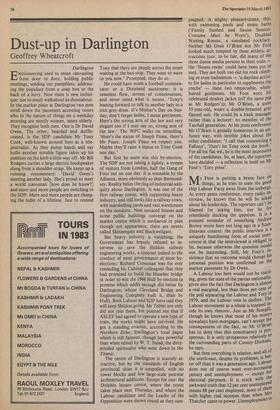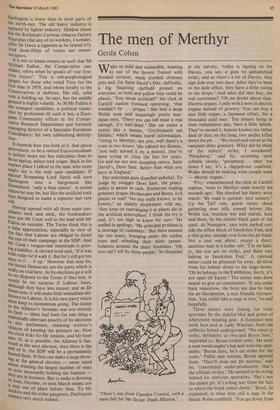Dust-up in Darlington
Geoffrey Wheatcroft
Darlington
Electioneering used to mean canvassing from door to door, holding public meetings, sending out pamphlets, address- ing the populace from a soap box or the 'back of a lorry. Now there is new techni- que: not so much walkabout as shoutabout. In the market place at Darlington two men stroll down the pavement accosting voters who in the nature of things on a weekday ,morning are mostly women, many elderly. They recognise both men. One is Dr David Owen, The other, bearded and duffle- coated, is the SDP candidate Mr Tony Cook, well-known around here as a tele- journalist. As they pump hands and say hullo another notable figure takes up his position on the kerb a little way off. Mr Bill Rodgers carries a large electric loudspeaker slung from a shoulder-strap. He keeps up a running commentary: 'David Owen's meeting another lady. She's proud to meet a world statesman [how does he know?] and more and more people are switching to the SDP. More and more people are chang- ing the habit of a lifetime. Just to remind
Tony that there are people across the street waiting at the bus-stop. They want to wave to you now.' Prompted, they do so.
He could have made a football commen- tator or a Dixieland auctioneer: it is ceaseless flow, stream of consciousness, and never mind what it means. 'Tony's leaning forward to talk to another lady in a nice grey dress. It's Mother's Day on Sun- day, don't forget ladies, I mean gentlemen. Here's the strong arm of the law and very elegant too if I may say so, strong arm of the law.' The WPC walks on unsmiling. `Here's the statue of Joseph Pease, there's Mr Pease. Joseph Pease we respect you. Maybe they'll raise a statue to Tony Cook one day.'
But first he must win this by-election. The SDP are not taking it lightly, a stream of visitors from London, half the Gang of Four out on one day. It is winnable by the Alliance, more obviously so than Bermond- sey. Reality belies the ring of industrial anti- quity about Darlington. It was one of the first railway towns, with supporting heavy industry, and still looks like a railway town, with marshalling yards and vast warehouses on the outskirts. Neat terraced houses and stone public buildings converge on the market centre which is mediaeval in plan though not appearance; there are streets called Skinnergate and Blackwellgate.
But heavy industry is vanishing; the Government has bravely refused to in- tervene to save the Shildon railway engineering works, a contrast indeed to the conduct of most governments at most by- elections: Richard Crossman was for ever reminding his Cabinet colleagues that they had promised to build the Humber bridge in order to win the 1966 Hull by-election (a promise which oddly enough did better by Darlington, whose Cleveland Bridge and Engineering Company built it, than by Hull). Both Labour and SDP have said they will keep Shildon going. Mr Tebbit not only did not join them, but pointed out that if ASLEF had agreed to operate a new type of train, the works might have survived. He got a standing ovation, according to the Northern Echo, Darlington's local paper which is still famous, though less powerful than when edited by W. T. Stead, the dirty- minded spiritualist who went down in the Titanic.
The centre of Darlington is scarcely at- tractive, but by the standards of English provincial cities it is unspoiled, with no tower blocks and few large-scale postwar architectural additions. Except for one: the Dolphin leisure centre, where the count takes place next Thursday, and where the Labour candidate and the Leader of the Opposition were shown round as they cam- paigned. A mighty pleasure-dome, this, with swimming pools and steam baths (`Family Sunbed and Sauna Session: Costume Must be Worn'), Disabled Waiting Rooms, a simulated rockface. Neither Mr Ossie O'Brien nor Mr Foot looked much tempted by these athletic at- tractions (nor, to be fair, did many of the three dozen media persons in their train — the 'fitness room' could have been put to use). They are both too old for rock climb- ing or even badminton — 'a daytime activi- ty for ladies in particular to supplement the creche' — these two respectable, white- haired gentlemen. Mr Foot wore his celebrated donkey jacket (off the same peg as Mr Rodgers's); Mr O'Brien, a quiet 55-year-old, wears a double-breasted grey flannel suit. He could be a bank manager rather than a lecturer: no member of the Tatchell generation. At his press conference Mr O'Brien is genially humorous in an un- funny way, with terrible jokes about the other candidates: 'I call that committing a Fallony', 'Don't let Tony cook the book, For all his flat wit, he is the most impressive of the candidates. So, at least, the reporters have decided — a reflection in itself on Mr Foot's 'Tory press'.
Mr Foot is putting a brave face on things, as he tries to steer the good ship Labour Party away from the icebergs. At every press conference, every radio in- terview, he knows that he will be asked about his leadership. The reporters can't be blamed for asking him, nor he for relentlessly ducking the question. It is a pointed reminder of something Andrew Brown wrote here not long ago in a Scan- dinavian context: the public interview is a uniquely humiliating form of social inter- course in that the interviewed is obliged to lie, because otherwise the question would not be interesting. Still, Mr Foot's in- sistence that no outcome would change his personal position was confirmed on the market pavement by Dr Owen. A Labour loss here would not be startl- ing, given the state of the parties nationally, given also the fact that Darlington is almost a real marginal, less than three per cent of the poll separating the Labour and Tory in 1979, and the Labour vote in decline. The Labour movement as a whole is trapped in- side its own rhetoric. Just as Mr Scarg111, though he knows that most of his miners nowadays have mortgages, can't accept the consequences of the fact, so Mr O'Brien has to deny that this constituency is pro- sperous. It is only prosperous relatively to the surrounding parts of County Durham, he says. But then everything is relative, and all of the north-east, despite its problems, is bet- ter off than it was a generation ago. Labour does not of course want ever-increasing penury and unemployment — except for electoral purposes. It is stuck with the awkward truth that 12 per cent unemployed means 88 per cent employed, most of them with higher real incomes than when Mrs Thatcher came to power. Unemployment In
Darlington' is lower than in most parts of the north-east. The old heavy industry is replaced by lighter industry. Shildon closes but the Rothmans Carreras tobacco factory flourishes (did any of its workers, I wonder, Offer Dr Owen a cigarette as he toured it?). And three-fifths of voters are owner- occupiers.
It is not to home-owners as such that Mr Michael Fallon, the Conservative can- didate, refers when he speaks of 'our first- time buyers'. This is sub-psephological Jargon for those who voted Tory for the first time in 1979, and whose loyalty to the Conservatives is dubious. His old, solid vote is holding up, he says, but the middle ground is highly volatile. At 30 Mr Fallon is the Youngest candidate, a political resear- cher by profession (if such it be), a Euro- pean Community officer in the Conser- vative Research Department and formerly Managing director of a Specialist European Consultancy: his own unblushing descrip- tion.
It depends how you look at it. Sub specie aeternitatis, to be a retired Euro-consultant ts neither more nor less ridiculous than to he an ageing, minor rock singer. Back in the market-place I talked to the man who some might say is the only sane candidate. If elected Screaming Lord Sutch will turn Darlington into a fairground like Disneyland, 'only a beat centre'. A sound fellow he may be, but like the artificial rock face designed to make a reporter feel very old.
Having opened with all three main can- didates neck and neck, the bookmakers now put Mr Cook well in the lead with Mr Fallon an outsider. The Tories think this is a false appreciation, especially in view of the fact that Labour are obliged to direct the rest of their campaign at the SDP. And Mr Cook's tongue-tied ineptitude is prov- ing a liability. A shrewd local said, `If it was held today he'd walk it. But he's still got ten days to f... it up.' However that may be, the Social Democrats are the party which is Lean), on trial here. As by-elections go it will be no disgrace to the Tories if they lose. It would be no surprise if Labour loses, hough they have less excuse; and as Dr Owen says, it will make little immediate dif- ference to Labour. It is his own party which must keep its momentum going. The slump the Alliance's fortunes was not entirely its fault — there had been for one thing a statistically aberrant paucity of by-elections in this parliament, reducing SODPAL's chances of keeping the pressure on. Now the clock ticks for Mr Jenkins, and Mr Steel If, as is possible, the Alliance is flat- tened at the next election, then there is the end of it: the SDP will be a permanently busted flush. If they can make a large show- ing at the general election — never mind about winning the largest number of seats o even necessarily holding the balance — `neY are in business. But to make a showing in June, October, or next March means not a step out of place before then. To Mr Jenkins and the other gangsters, Darlington Matters very much indeed.











































 Previous page
Previous page